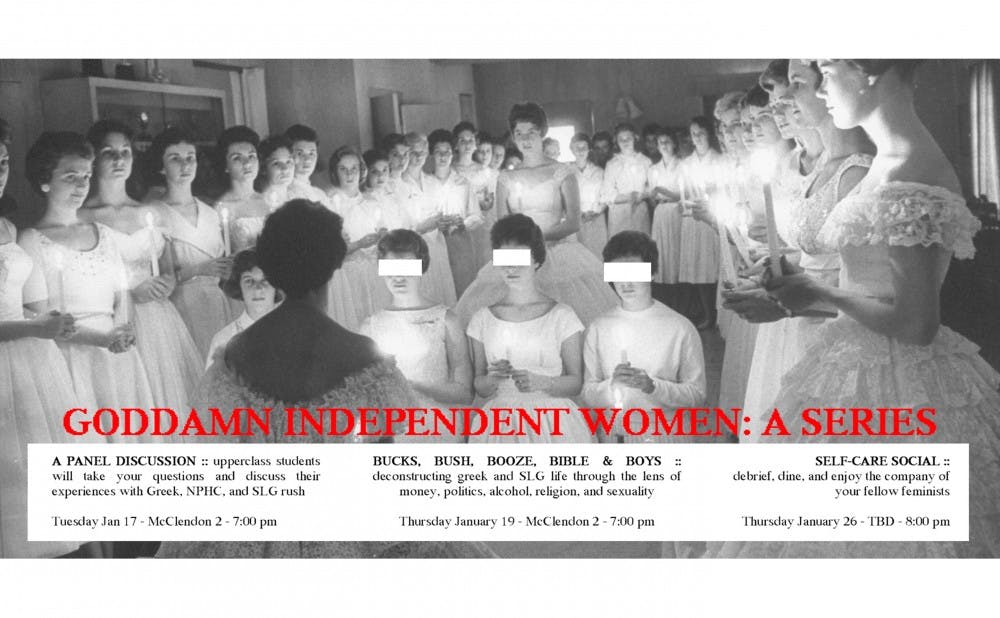For many Duke students, the first few weeks of the spring semester are synonymous with one word: rush. Hundreds of freshmen and sophomore students descend upon IFC, Panhellenic and SLG organizations to mingle with upperclassmen in hopes that they will be admitted to these exclusive organizations. It is a busy, trying time that affects most people on campus. For some, it is one of the most stressful experiences Duke has to offer.
Junior Lou Kendaru was once one of those freshmen desperate for a bid.
“As a first year, I wasn’t aware of the negative aspects of Greek life. I wanted to be in a top sorority! It was every woman’s dream, right?" Kendaru said. "I was conditioned to want this so badly, to feel this way."
Kendaru joined Kappa Alpha Theta, a Panhellenic organization, and Mirecourt, an SLG, and soon had wildly different experiences within the two organizations. She quickly noticed that Mirecourt was “strikingly different in terms of racial, sexual, and gender diversity,” whereas her sorority was “overwhelmingly white.” (Kendaru is mixed-race). Feeling like an outsider within Kappa Alpha Theta, she deactivated by the end of her freshman year.
Two years later, Kendaru and the rest of an on-campus feminist organization called The Feminist Make-Space are hosting a week-long panel event, “Goddamn Independent Women: A Series,” that aims to show rushing freshmen and sophomore women that independent life is a viable alternative to Greek life that eschews its negative aspects. The event kicked off Jan. 17 with a panel discussion. Independent upperclassmen took audience questions about their experiences with Greek, NPHC and SLG rush.
Senior Liz Kennedy, one of the organizers of the event, stayed far away from all forms of rush her freshman year. She knew coming into Duke that sorority or otherwise-affiliated life was not something she wanted to participate in, and she considers herself "a proud GDI," a colloquial abbreviation for goddamn independent.
“I am a mixed race black woman, but I also identify as queer,” Kennedy said. “Panhel was not a place where I felt welcome. It seemed super b***** and super white—things that I was not.”
Kennedy is now a member of the Baldwin Scholars, a living learning organization comprised of solely women—some of whom are affiliated with sororities and SLGs. Kennedy cites the program and The Feminist Make-Space as ideal spaces for women on campus.
“There’s a fundamental lack of diversity in Panhel,” said Kennedy. “You can see so much racism, tokenism and homophobia.”
Kendaru echoed a similar sentiment.
“As a mixed race woman who can conform to Eurocentric beauty standards, I felt complicit in perpetuating this privilege.”
Now, The Feminist Make-Space is trying to make their platform heard amongst the hustle and bustle of rush. This past weekend, Kendaru, Kennedy and several other members of the group visited the Durham Convention Center to hand out Feminist Make-Space flyers to rushing freshmen and sophomores during a break in the Panhellenic rush schedule. Some of the flyers advertised “Goddamn Independent Women: A Series,” while others showed statistics highlighting the lack of women of color in Greek organizations. Another one was styled as a pop quiz, alternately referring to Duke panhel sororities as “whiter” than “an artic storm,” “Congress” and “mayonnaise.” Kendaru, Kennedy and the others handed out flyers to recruits for six minutes until Panhel organizers asked them to leave.
After the incident at the Convention Center, several sorority members contacted Kendaru to express their disapproval.
“At least one member reached out saying they don’t necessarily agree with our stance,” Kendaru recounted. “To them, it felt like people were attacking and judging sorority members.”
Kendaru and Kennedy acknowledge that the line between attacking a system and attacking people is a fine one, and they assert that they have done their best to avoid hurting people’s feelings. Kennedy notes that both sororities and The Feminist Make-Space are women’s groups, and pitting the two against each other could be construed as divisive feminism. However, she says that The Feminist Make-Space aims not to dismantle people, but to disrupt a system with critical thinking and open dialogue.
“We are an activist group. Disruption is part of our culture. We were peaceful and compliant, but our message was heard,” Kennedy said. “This is a pushback against a white supremacist heterocispatriarchy.”
Kendaru believes that there is space for feminist discourse within a women’s organization such as a sorority, especially with the uncertainty of the Trump presidency looming.
“Panhel sororities can be seen as a safe space for women in a Trump era,” conceded Kendaru. “Feminism isn’t monolithic. If you can defend your position, more power to you! There are a lot of feminists in Greek life, but I want to bring greater awareness of intersectionality into this discourse.”
Through “Goddamn Independent Women: A Series,” Kendaru and Kennedy are bringing this intersectional discourse to a dialogue that often excludes non-white, non-heterosexual voices. The series will continue on Thursday, Jan. 19 in McClendon 2 with “Bucks, Bids, Booze, Bible, and Boys,” a discussion group to deconstruct Greek and SLG life through the lens of money, politics, partying, religion and sexuality. It will conclude on Thursday, Jan. 26 with a post-rush “Self-Care Social” open to all students—affiliated or not.
Kennedy is excited for the rest of the program, citing high attendance and enthusiastic participation. To her, this indicates a willingness to entertain anti-Greek life dialogue.
“Greek life has an element of feminism to it,” Kennedy said. “However, they can’t claim to be a space for subversion and rebellion while they still produce racism, homophobia and classism.”
“Everyone is touched by rush,” Kendaru lamented. “But many more people are hurt and excluded than benefitted.”
Get The Chronicle straight to your inbox
Signup for our weekly newsletter. Cancel at any time.

